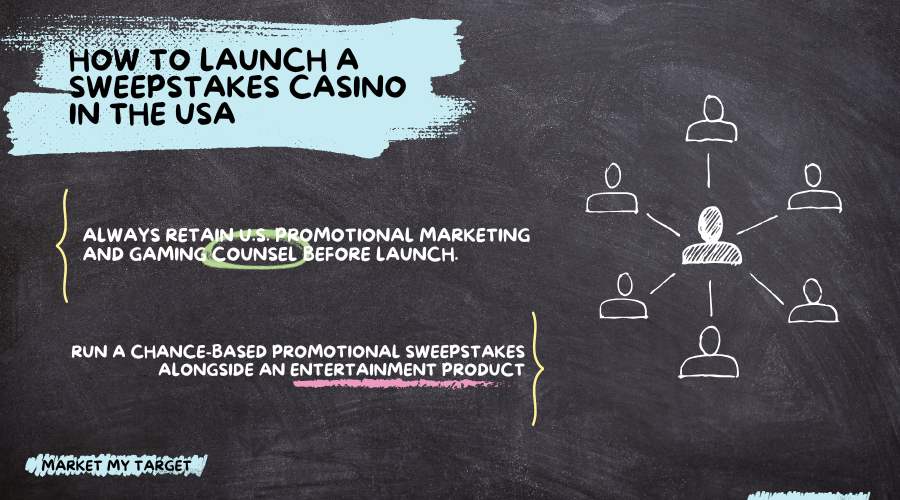How to Launch a Sweepstakes Casino in the USA (2025): Complete Guide
- Somyak Dhar
- Apr 17, 2025
- 7 min read
If you’ve ever searched “how to start an online casino without a gambling license,” you’ve already brushed up against the Sweepstakes Casino USA model. The core idea is simple: run a chance-based promotional sweepstakes alongside an entertainment product, ensure “no purchase necessary” entry (AMOE), and design your product so real-money cash redemptions only flow from the sweepstakes currency - not from the entertainment currency.
Table of Contents
What makes a sweepstakes casino legal? AMOE, chance & consideration
2025 regulatory map: green, gray, and red-flag jurisdictions
Step-by-step: Incorporate in the U.S. & set your legal foundation
Banking & payments: high-risk realities and practical setups
Games & suppliers: coverage, terms, and live-dealer expectations
Marketing with guardrails: ads, affiliates, and age-gating rules

The sweepstakes casino model (and why 2025 is the moment)
If you’ve ever searched “how to start an online casino without a gambling license,” you’ve already brushed up against the Sweepstakes Casino USA model. The core idea is simple: run a chance-based promotional sweepstakes alongside an entertainment product, ensure “no purchase necessary” entry (AMOE), and design your product so real-money cash redemptions only flow from the sweepstakes currency - not from the entertainment currency.
2025 is a pivotal year: user acquisition is costly in mature, licensed markets, while social-first sweepstakes experiences are scaling fast across almost all U.S. states. The upside is real, but so are the rules.
Not legal advice: This guide is educational. Always retain U.S. promotional marketing and gaming counsel before launch.
What makes a sweepstakes casino legal? AMOE, chance & consideration
To avoid being treated as illegal gambling, your promotion must steer clear of the classic triad (prize, chance, and consideration). You can’t remove prize or chance, so you remove consideration by offering a bona-fide Alternative Method of Entry (AMOE)—a way to enter that does not require purchase. (States like Florida and New York also impose registration/bonding above prize thresholds, so planning matters.)
Your legal pillars:

Clear Official Rules (eligibility, how to enter (including AMOE), odds, prize details, drawing/redemption mechanics, start/end dates).
No purchase necessary pathways that are equal in dignity to paid play (no unreasonable friction).
Eligibility and void where prohibited language; conspicuous disclosures across product and marketing.
State filings/bonds when applicable (e.g., FL and NY for certain prize pools).
Operational separation between entertainment spend and sweepstakes entries/redemptions.
The two-wallet model explained: Gold Coins vs. Sweeps Coins
The modern sweepstakes casino uses a dual-currency design:
Gold Coins (GC): Purchased for entertainment; used for non-redeemable play.
Sweeps Coins (SC): Never sold. Granted as bonuses, via AMOE, or via promotional activities. SC winnings can be redeemed for cash per Official Rules.
This structure underpins your “no consideration” position for sweepstakes entries while maintaining a robust entertainment loop for paying users. Document the separation meticulously in your rules, UI, receipts, and CRM.
2025 regulatory map: green, gray, and red-flag jurisdictions
Most U.S. jurisdictions allow promotional sweepstakes with proper AMOE and disclosures. Some states impose added constraints or treat social casinos unfavorably under gambling laws (notably Washington via case law, with ripple effects for virtual-currency casino models), and others are re-evaluating policy. Build your go-/no-go plan with counsel and stay agile.
Step-by-step: Incorporate in the U.S. & set your legal foundation
Form a U.S. entity (LLC or C-Corp). Choose a state (e.g., DE for corporate case law, others for speed/fees). Get your EIN and foreign-qualify where you have nexus.
Registered Agent & licenses. Maintain a registered agent in each formation/qualification state; obtain general business licenses where required.
Promotions counsel. Have counsel draft Official Rules, review UX copy, AMOE mechanics, and state filings (FL/NY where applicable).
Policies & controls. Draft AML & KYC SOPs (even if you’re not a financial institution), age-gating, geoblocking, content moderation, complaint handling.
Insurance. Cyber, media liability, and errors & omissions are table stakes.
Crafting an AMOE that actually passes scrutiny
AMOE is the backbone of a compliant Sweepstakes Casino USA operation:
Equal dignity: Odds and prize pools must be identical for AMOE and paid users.
Friction parity: AMOE shouldn’t be materially harder than paid entry (e.g., limited, clear steps like mail-in, web form, or social promo entry).
Visibility: AMOE appears wherever you promote purchase-based entries (headers, offer modals, footers, help center).
Auditability: Log AMOE entries, timestamps, eligibility, and prize fulfillment.
Practical formats: Mail-in entries, on-site forms with identity verification, limited daily caps per user to manage fraud.
Banking & payments: high-risk realities and practical setups
Traditional PSPs often decline social/sweepstakes models. Expect to assemble a high-risk payment stack:
Cards + ACH + digital wallets + cash-at-retail + crypto (where permitted by policy).
Rolling reserves (5-15%), higher MDRs, and enhanced KYC/chargeback workflows.
Payment orchestration: Use cascading/routing rules to maximize auth rates and minimize cost.
Sanctions checks for payouts (OFAC SDN screening) and velocity rules for fraud.
Games & suppliers: coverage, terms, and live-dealer expectations
Breadth matters: Launch with 500-800 titles and a roadmap to 1,500+ across slots, instant-wins, crash, and table variants.
Live dealer: A strong lever for retention - negotiate geographic/IP rights and latency SLAs.
“Sweeps-ready” content: Not all studios will contract for sweepstakes. Prioritize providers with sweepstakes-compliant math models and promo tools.
RNG & testing: Independent lab certificates, version control, change logs, and regular RTP audits.
Marketing with guardrails: ads, affiliates, and age-gating rules
Truth-in-advertising: Clear “no purchase necessary,” eligibility, prize values, and AMOE disclosures across creatives and pages.
Affiliate programs: Vet partners, mandate compliant disclosures, and forbid “gambling” claims where you’re promoting sweepstakes entries.
Influencers/UGC: Use FTC disclosure rules for endorsements and avoid implying guaranteed outcomes.
Ad networks & social: Expect policy reviews; maintain a compliance sheet for each platform’s restricted-vertical rules.
Messaging: If using email/SMS, comply with CAN-SPAM and TCPA (express written consent for marketing texts; honor opt-outs)
Privacy, data & messaging laws you can’t ignore
COPPA: No targeting under-13s; age-gating and parental consent rules apply to any child-directed features.
CCPA/CPRA (CA) & other state privacy laws: Post a compliant privacy notice, honor access/deletion/opt-out rights, and manage data-sharing disclosures.
Security: Encrypt PII in transit/at rest, maintain breach-response runbooks, and vendor DPAs.
Risk management: geoblocking, KYC/AML, sanctions & fraud
Geofencing: Block prohibited states/territories and ensure your rules say “void where prohibited.”
KYC tiers: Light KYC on sign-up; full KYC on first redemption or upon velocity/fraud triggers.
Sanctions & PEP: Screen users and payout instruments against OFAC lists.
Responsible play: Reality checks and cool-off tools - even if not required - reduce harm and brand risk.
Content controls: Ban multi-accounting, bonus abuse, bots; preserve device/browser fingerprints.
Build plan: a realistic 6-month launch timeline
Months 1-2 | Foundation
Entity, EIN, registered agent, bank/PSP applications
Counsel engaged; draft Official Rules & privacy/terms
UX copy for disclosures; AMOE design finalized
Shortlist content & orchestration vendors
Months 3-4 | Integrations
Platform theming; currency/wallet logic
PSP + orchestration + KYC vendors live in sandbox
Game providers integrated; QA and lab certs
AMOE pipeline tested end-to-end; logging/BI stitched
Months 5-6 | Soft launch → Scale
Closed beta (100-500 users); fix breakage
Affiliate program onboarding + influencer slate
Soft launch (one or two “green” states)
Public launch; weekly compliance & KPI reviews
Add 30-60 days of contingency for payments approval, game lab queues, and policy reviews.
Budget ranges: setup, ops, CAC, and contingency
One-off setup: $100k-$250k (platform license/customization, legal, initial games, orchestration, QA/cert, branding)
Monthly run-rate: $40k-$120k (platform fee, hosting/CDN, game rev-share, PSP fees, support, compliance)
Marketing/CAC: Early-stage spend often equals 40-60% of revenue; affiliates + creator content are your best ROAS bets.
Reserves/contingency: Keep 3-6 months OPEX plus PSP reserves.
KPIs that matter (and the ones that don’t)
Watch closely: first-deposit conversion, cost per depositing user (CPDU), Sweeps Coin redemption rate, Day-30 retention, ARPDAU, chargeback rate, auth rate by BIN, AMOE participation rate, cost per quality registration (CPQR).
Vanity KPIs: raw sign-ups without KYC, impressions, top-line spins played without context.
Common mistakes that get operators in trouble
Hiding AMOE or making it materially harder than paid entry.
Selling sweepstakes currency (SC) or allowing indirect “sales” through UX dark patterns.
Missing registrations/bonds in states like FL/NY when prize pools cross thresholds.
Non-compliant messaging: texting without TCPA consent; emails without CAN-SPAM compliance.
Marketing to minors or child-directed placements (COPPA).
Operating in “red-flag” states without counsel; ignoring Washington case law context for social casino.
FAQs - How to Launch a Sweepstakes Casino in the USA
Q. Is a sweepstakes casino legal in all 50 states?
No. Most states permit promotional sweepstakes with proper AMOE and disclosures, but some impose additional filings/bonds; a few are hostile to social-casino constructs. Vet each state with counsel.
Q. Do I need a gambling license?
For a properly structured sweepstakes, typically no - but that hinges on real AMOE, clear rules, and strict separation of currencies. Get a legal opinion before launch.
Q. Can I advertise on Meta/Google/TikTok?
Often yes, under restricted-vertical policies and with compliant disclosures. Expect manual reviews and creative reworks.
Q. When do I KYC?
At minimum on first cash redemption and earlier if risk signals fire (velocity, device sharing, sanctions hits).
References
Florida “Game Promotion” statute (sweepstakes rulemaking & bonding): Fla. Stat. § 849.094. Delaware Corporations
New York sweepstakes bonding/registration: N.Y. Gen. Bus. Law § 369-e (overview). Surety1
Washington State Gambling Commission notice re: Kater v. Churchill Downs (Big Fish) and virtual-currency casinos. Washington State Gambling Commission
FTC: CAN-SPAM Act - A Compliance Guide for Business. Delaware Corporations
FCC: TCPA/47 C.F.R. § 64.1200 (text/robocall marketing rules).
FTC: COPPA (Children’s Online Privacy Protection Rule) guidance.
California OAG: CCPA/CPRA business compliance resources.
OFAC: U.S. sanctions lists & screening guidance.
Delaware Division of Corporations: entity formation overview.
Ready to move from idea to launch?
If you want an experienced partner to thread the needle - AMOE that holds up, two-wallet UX that converts, payments that clear, and marketing that scales without tripping compliance - our team at Market My Target helps iGaming businesses build and grow sweepstakes products in the U.S. market.
Final word: A compliant Sweepstakes Casino USA isn’t a loophole - it’s a disciplined operating model. Nail the rules, then scale the experience.




